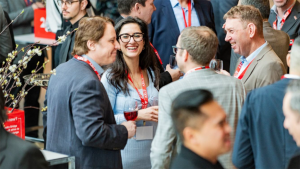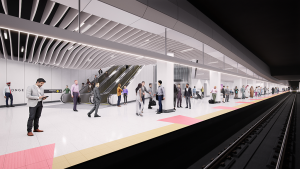Infrastructure will play a key role in future climate change mitigation, according to two sustainability experts.
Arup sustainability and climate services leader Charles Ormsby and principal of infrastructure Sean Meadows pointed to sustainability at the large-scale infrastructure level as key to the well-being of Canadians going forward on a recent episode of The Construction Record podcast.
“It’s all looking at it as part of a bigger picture. We know an enormous amount of our population throughout the world are living in cities and urbanization is just going to increase. That’s a Canadian issue, but that’s a global issue as well,” Ormsby said. “We have cities which we have to work with to make more resilient, more sustainable, more inclusive and more equitable all across the board.”
The complexity of the problem requires a higher level of integration between disparate systems to respond to climate change, he added.
“We need to ensure that we have all sorts of urban systems that are in place to respond to that, whether that’s energy or transport, water, housing. All of this has to be provided in a manner that means it’s accessible to all, appropriate for all and helps us as a globe transition to a zero-carbon community and respecting the planetary boundaries within which where we’re living,” Ormsby said.
Key to enhancing sustainability and lowering carbon use is an increased emphasis on public transportation infrastructure which takes cars off the road, Meadows said but he cautioned, “there’s still a long way to go.
“Without looking at it from a circular economy perspective, particularly thinking about the construction materials that we’re using. What is the outcome of these materials in their 30-year life cycle and what happens to all this material when we’re tearing it down?” he asked.
He added while there have been great strides in vehicle technology in recent years, it’s important to also create energy-efficient solutions that allow electric vehicles to be powered and have more of an impact on lowering carbon emissions, particularly regarding buses and other transit vehicles.
“These are all ingredients of the recipe towards net-zero transport,” Ormsby added. “Transit is one of the elements and looking beyond that is a multi-modal approach and ensuring that individuals have access to multiple options so that they can affordably get to where they need to go, and at the same time looking at the bare essentials of bringing those services closer.”
Ormsby added while Canada faces its own challenges regarding climate change, how we act can have a global impact just as how other nations decide to deal with climate change can affect Canada.
“We have to work on this in a collaborative effort. We have to see this as not just a community issue, not just a national issue, but actually an international issue where we have one planet and the effects that are done or the impacts that we have locally may have other repercussions that are international and vice-versa,” he said.
Meadows said Arup has seen significant interest from clients in better addressing sustainability and mitigating the effects of climate change.
“There’s been a significant push where we’re seeing more and more clients and more and more cities actually looking to implement green infrastructure in more creative ways, to look at how do we deal with wastewater and how do we deal with some of these flooding situations in a green way versus building more and more sewer tunnels,” Meadows said.
“A lot of clients are coming to us and saying, ‘we want to have a positive impact as a result of this project on the society on the environment,’” Ormsby added.
While sustainability has a reputation for coming at a higher cost than traditional methods of construction, Ormbsy said if approached properly it can be more affordable.
“Sustainability does not mean more expensive if it’s done well at the right time. It’s actually cost-effective. That’s why the three pillars of sustainability are society, the environment and the economy. We have to think of those three elements together,” Ormsby said.
Follow the author on Twitter @JOCFrey.
The Construction Record – Episode 182: Charles Ormsby and Sean Meadows of Arup








Recent Comments
comments for this post are closed